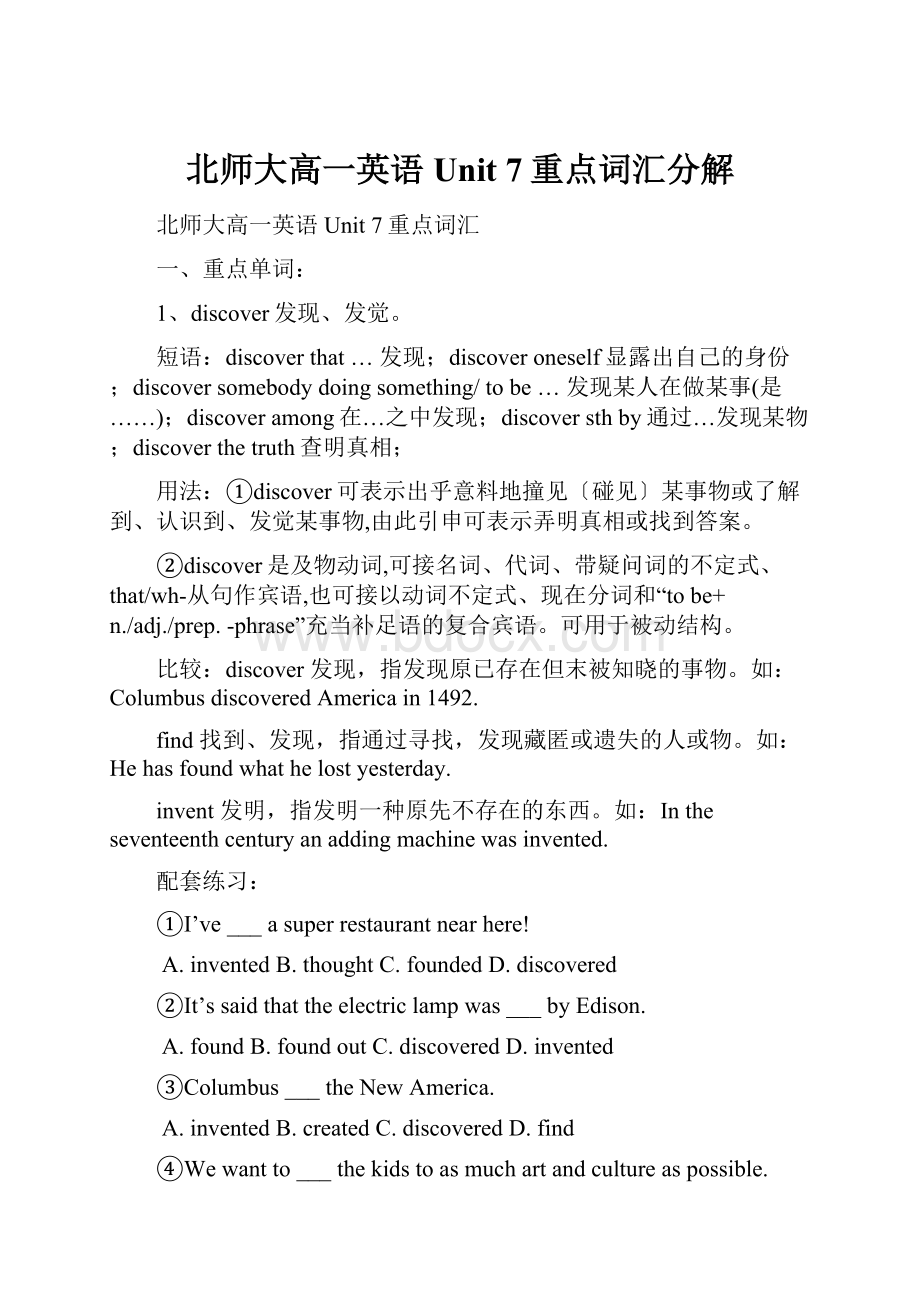北师大高一英语Unit 7重点词汇分解.docx
《北师大高一英语Unit 7重点词汇分解.docx》由会员分享,可在线阅读,更多相关《北师大高一英语Unit 7重点词汇分解.docx(36页珍藏版)》请在冰豆网上搜索。

北师大高一英语Unit7重点词汇分解
北师大高一英语Unit7重点词汇
一、重点单词:
1、discover发现、发觉。
短语:
discoverthat…发现;discoveroneself显露出自己的身份;discoversomebodydoingsomething/tobe…发现某人在做某事(是……);discoveramong在…之中发现;discoversthby通过…发现某物;discoverthetruth查明真相;
用法:
①discover可表示出乎意料地撞见〔碰见〕某事物或了解到、认识到、发觉某事物,由此引申可表示弄明真相或找到答案。
②discover是及物动词,可接名词、代词、带疑问词的不定式、that/wh-从句作宾语,也可接以动词不定式、现在分词和“tobe+n./adj./prep.-phrase”充当补足语的复合宾语。
可用于被动结构。
比较:
discover发现,指发现原已存在但末被知晓的事物。
如:
ColumbusdiscoveredAmericain1492.
find找到、发现,指通过寻找,发现藏匿或遗失的人或物。
如:
Hehasfoundwhathelostyesterday.
invent发明,指发明一种原先不存在的东西。
如:
Intheseventeenthcenturyanaddingmachinewasinvented.
配套练习:
①I’ve___asuperrestaurantnearhere!
A.inventedB.thoughtC.foundedD.discovered
②It’ssaidthattheelectriclampwas___byEdison.
A.foundB.foundoutC.discoveredD.invented
③Columbus___theNewAmerica.
A.inventedB.createdC.discoveredD.find
④Wewantto___thekidstoasmuchartandcultureaspossible.
A.uncoverB.discoverC.teachD.expose
⑤I’lltellyouthesecret,butpleasedon’t___ittoanybodyelse.
A.speakB.exposeC.uncoverD.discover
2、persuade说服、劝说。
短语:
persuadesomebodyofsomething就某事劝说某人;persuadesomebody(not)todosomething=persuadesomebodyinto/outofdoingsomething劝某人(不)做某事;persuadehimtoourwayofthinking使他接受我们的想法;persuadehimofitstruth/thatitwastrue使他相信这是真的;persuadehimthatthismedicineisexcellentforcolds使他相信这药是治感冒的特效药;persuadeintowriting 劝某人写信;persuadeof 使某人相信;persuadeofitstruth 说服某人相信它的真实性;persuadeoffidea 劝某人打消念头;
用法:
①persuade既可用作及物动词,也可用作不及物动词。
用作及物动词时,后可接名词或代词作宾语;作不及物动词时,主动形式常含有被动意义,即主语是被说服的对象,这种用法通常见于一般时态,并带easily之类的状语,说明“说服”的难易度。
persuade还可接以动词不定式充当补足语的复合宾语。
②persuade作“使相信,使确信”解时,其后可接of引出相信的内容。
当of的宾语是that从句时,of须省略。
③persuadeinto可表示“说服某人做某事”;persuadeout则表示“说服某人不做某事或放弃某想法”。
类似用法:
talksb.into/outofdoingsth.=reasonsb.into/outofdoingsth.说服某人做/不做某事;tricksb.into/outofdoingsth.诱使某人做/不做某事;urgesb.into/outofdoingsth.怂恿某人做/不做某事;
④persuade可用于被动结构。
⑤persuade后可带副词或介词短语的复合结构,表示“劝说某人到某处或做某事”。
如:
persuadeheroutofherfoolishplans劝她打消那些愚蠢的计划。
⑥在表示“劝说不一定成功”时,前面常加tryto或wantto,如:
Theteachertriedtopersuadehimnottowastehistime.
比较:
advise强调“劝告,建议”的动作,不注重结果;而persuade强调“已经说服”,重在结果。
用法上:
advise可跟v.-ing形式作宾语,也可以接that-clause(thatsb.shoulddo),而persuade则不能。
配套练习:
①Alicetrustsyou;onlyyoucan___hertogiveupthefoolishidea.
A.suggestB.attractC.temptD.persuade
②I___theboytosavesomemoneyforthefuture,buthewouldn’tlisten.
A.hopedB.suggestedC.persuadedD.advised
③I___him___,butherefused.
A.persuaded;togohomeB.persuaded;fromgoinghomeC.prevent;fromgoinghome
D.triedtoprevent;goinghome
④Whileshopping,peoplesometimescan’thelp___intobuyingsththeydon’treallyneed.
A.persuadeB.persuadingC.beingpersuadedD.bepersuaded
3、attract吸引、引起。
短语:
attractone’sattention(to)=drawone’sattention(to)引起某人的注意;beattractedby被……所吸引;attractto 把…引向;attracttosb 对…有吸引力;attracttowards 把…引向;attractwithlamps 以灯火引诱;attractalotofpublicity 出尽风头;attractadmiringglances 招引钦佩的眼光;attractdisapprovingcomment 引起非议;attractlargecrowds 吸引大批的民众;
用法:
①和attract有相似意思的tempt指“引诱,诱惑”,有时候两个词容易混淆。
如:
Thesceneryattractedhertoloiterontheway.路上的风景引诱她一直在徘徊。
②attract的基本意思是“吸引”,引申表示“引起…注意”。
其原因可以是吸引者具有吸引力的性质或特性,也可以是被吸引者对施动者具有吸引力或对施动者的影响非常敏感。
当指人的异性吸引时,表示激起被吸引人强烈的羡慕或者唤起爱情或欲望。
③attract主要用作及物动词。
主语可以是人,也可以是物,还可以是beauty、goodness等抽象名词。
宾语可以是人,也可以是物,还可以是attention、glances等抽象名词。
attract偶尔可用作不及物动词,是“具有吸引力”“引人注意”的意思。
④attract多用于一般时态,可用于被动结构。
配套练习:
①WheneverI’mseatedalonginthelivingroom,Ifindmyself___tothephotoofhers___onthewall.
A.attracting;hangingB.attracted;hungC.attracted;hanged
D.beingattracted;beinghung
②Thewonderfulperformances___thepassers-by’sattention.
A.attractedB.attackedC.demandedD.paid
③Sthinthedarkattractedmyattention.Whichcanreplacetheunderlinedword?
A.drawB.devotedC.drewD.held
④Thewholeattentionintheworldwas___ontheproblemofhowtocontrolbirdfluthen.
A.paidB.attractedC.focusedD.concerned
⑤Thatescapedprisonercampedin___woodbuthedidn’tlightafirebecause___smokerisingfromthewoodsmightattract___attention.
A./;the;/B.a;a;theC.a;the;/D.a;/;/
⑥Thenewplayhas___agooddealofcriticism.
A.givenB.attractedC.broughtD.taken
4、recognize认识、认出(=makeout)、承认。
短语:
berecognized/knownas承认是、认为是;recognizethebookasthebestone/tobethebestone认为这本书是最好的;beyond/outofrecognition认不出来;IrecognizethatheisclevererthanIam我认识到他比我聪明;recognizesb.认出某人;recognizeone’svoice听出某人的声音;recognizeas 认为是…;recognizefrom 根据…认出;
用法:
①recognize是及物动词,接名词或代词作宾语,也可接that从句或疑问词从句作宾语。
②recognize可接tobe/as+n./adj.充当补足语的复合宾语,意思是“认出…是…”或“承认〔确认〕…是…”,as和tobe不可省略。
③recognize在作“认出”解时,是瞬间动词,不用于进行体,也不能用于现在完成时。
在作“承认”“公认”解时,可以用现在完成时。
④要表示认识某人用know,表示从不认识到认识用get/cometoknow,recognize为短暂动词,不可和表示一段时间的状语连用。
⑤recognize要用tobe或as引导宾语补足语,主动结构多用tobe,被动结构多用as引导。
配套练习:
①—Oh,it'syou!
Iyou.—I'vejusthadmyhaircut,andI'mwearingnewglasses.
A.didn'trecognizeB.hadn'trecognizedC.haven'trecognizedD.don'trecognize
②Walkinginthestreet,heusuallyworeapairofdarkglassestoavoid___.
A.recognizingB.torecognizeC.beingrecognizedD.toberecognized
③Thetownhaschangedsomuchthatyouwouldn’t___it.
A.realizeB.distinguishC.recognizeD.recommend
④Itisdifficultforme___him,becauseIhaven’tseenhimfor20years.
A.toknowB.tobeknownC.torecognizeD.toberecognized
5、survive幸存、生存;
短语:
surviveinthedesert在沙漠中活下来;survivethefire经过大火而活下来;survivesbby15years比某人多活15年;surviveonsth.靠……生存(意思等同于liveonsth.);surviveafter 在…后余生;surviveallperils 大难不死;survivetheassaults 遭到攻击后幸存;survivedisaster 幸免于难;surviveone'shealth 年老体衰;survivetheshipwreck 在海难中生还;surviveone'susefulness 年老无用;survivethewar 在战争中幸免于死;
用法:
①survive可用作及物动词,也可用作不及物动词。
用作及物动词时,后接名词或代词作宾语。
可用于被动结构。
②survive作vt,宾语指人,表示比某人(通常是直系亲属)活得长,宾语后可接by,表示“比某人多活……年”;宾语表示危险、灾难、攻击、动乱等时,表示“幸免于”。
如:
Shesurvivedherhusbandbytenyears.Miraculously,theysurvivedthebombing.
配套练习:
①Itisawonderthattheoldhouse___theearthquake.
A.wassurvivedB.survivedC.wassurvivingD.hasbeensurvived
②Indryweather,theflowerswillhavetobewateredifthey___.
A.havesurvivedB.aretosurviveC.wouldsurviveD.willsurvive
③You’rereallyluckyenough___thatterribleearthquake.
A.forsurvivingB.tohavesurvivedC.tosurvivedD.havingsurvived
④Onlyonebaby___theterriblecarcrashlastweek.
A.reviewedB.livethroughC.survivedD.existed
6、apologize道歉,apology道歉、认错。
短语:
apologizetosomebodyforsomething/doingsomething/whatIhavedone为某事向某人道歉;apologizeforfault 为过失道歉;apologizeformistake 为错误道歉;apologizefornotansweringletterintime 为延误回信道歉;apologizeforoneself 替自己辩护;apologizeforrudeness 为无礼道歉;apologizeto 向某人道歉;apologizewithabadgrace 勉强道歉;apologizewithagoodgrace 欣然道歉;
用法:
①apologize通常用作不及物动词,表示“向某人道歉”,接tosb;表示“因某事道歉”,接forsth;表示“因某事向某人道歉”,则接tosbforsth。
②apologize也可接that从句,这时用作及物动词,意思是“道歉说…”。
apologize还可引出直接引语。
③apologize是不及物动词,后跟for加(动)名词,不跟不定式表示道歉的原因。
回答同sorry一样,可用:
Itdoesn’tmatter/That’snothing/That’sOK(allright)/It’snotimportant/Nevermind等。
配套练习:
①Imust___heranapologyfornotgoingtoherparty.
A.makeB.offerC.doD.accept
②Thestudentapologized___late.
A.tohisteachertoarriveB.tohisteacherforarrivingC.athisteacherforarrive
D.athisteacherforarriving
③Thecaptain___anapologytothepassengersforthedelaycausedbybadweather.
A.madeB.saidC.putD.passed
④Imustapologizefor___aheadoftime.That’sallright.
A.lettingyounotknowB.notlettingyouknowC.lettingyouknownot
D.lettingnotyouknow
7、terrify使恐惧、使恐吓;terror(n)恐怖、惊骇;terrificadj.令人恐怖的;terrified感到惊恐的;terrifying令人恐怖的;terrible可怕的、恐怖的;
短语:
beterrifiedoutofone’swits/senses吓得魂不附体;beterrifiedof/by对……感到惊恐;beterrifiedat/with被……吓一跳;beterrifiedoutofone’ssenses/wits吓得魂不附体;terrifysbintodoingsth恐吓某人做某事;
用法:
①terrify是及物动词,接名词、代词或that从句作宾语,可用于被动结构。
②terrify的过去分词terrified可用作形容词,在句中作表语。
配套练习:
①The___lookonhisfaceshowsthathe’sgreatly___.
A.terrified;terrifyingB.terrified;terrifiedC.terrifying;terrifying
D.terrifying;terrified
②Seeingthe___sight,thegirlwasnearly___todeath.
A.terrifying;terrifiedB.terrifying;terrifyingC.terrified;terrified
D.terrified;terrifying
③She___byhisappearance,forshedidnotfinishthetaskhegave.
A.isterrifiedB.wasterrifiedC.terrifyD.terrified
④Thelittlegirl___atthedogbecauseshewasoncebitten.
A.terrifiedB.isterrifiedC.wasterrifiedD.terrify
⑤A___voicewasheardaroundtwelvelastnight,sothatmydaughterwas___.
A.terrified;terrifiedB.terrifying;terrifiedC.terrifying;terrifying
D.terrified;terrifying
8、escape逃跑、逃脱(U)、逃走的路、逃脱的方法(C)。
短语:
Thereisnoescapinghim怎么也避不开他;makeone’sescape逃走;fireescapes太平梯;escapetosomewhere逃往某地;escapedoingsomething逃避做某事;escapefrom/outofsomewhere/something从某处(事)中逃脱;yournameescapedme我忘了你名字;escapefromprison 越狱;escapeoutofaburninghouse 从燃烧着的房子里逃出来;escapethrough 从…里跑掉;escapetoaforeignland 逃到外国;escapewithone'slife 逃命;escapewithoutharm 安然逃脱;
用法:
①某人逃跑了用escape,后不加away;快逃啊,用run,不用escapequickly;鸟从笼中脱逃不用escape,要用flyaway。
②escape可用作及物动词或不及物动词。
用作及物动词时,跟名词、代词、动名词作宾语,不能跟动词不定式。
③escape用作不及物动词时,后接from(英)〔outof(美)〕,意思是“从…逃出”。
④escape的过去分词escaped可用作形容词,在句中作定语,意思是“逃走的,逃跑的”。
⑤escape作“避免”“被遗忘”解时,不能用于被动结构。
⑥escape作名词时可指“逃跑,逃脱”或“排出,漏出”的动作,也可指“逃跑的工具”“逃跑之路”或“出口”。
作前者解时是不可数名词,作后者解时是可数名词。
escape引申还可指用来暂时逃避现实的“消遣物”,常用单数形式。
⑦escape在句中可用作主语、宾语、介词宾语,还可用作定语。
配套练习:
①Henarrowlyescaped___.
A.killingB.beingkilledC.t